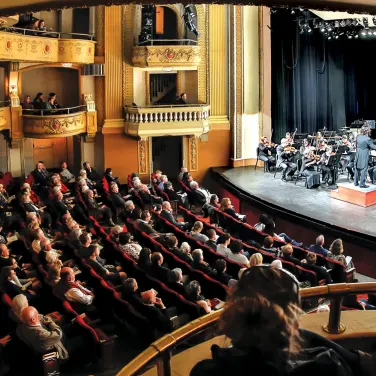
About
No info to show.
Frequently Asked Questions
- What is the average salary for a symphony orchestra musician?
- The average salary for a symphony orchestra musician in the United States varies widely depending on factors such as orchestra size, location, musician experience, and tenure. According to the International Conference of Symphony and Opera Musicians (ICSOM), musicians in major U.S. orchestras can earn annual base salaries ranging from $50,000 to over $150,000. For example, principal players or those in leadership roles may earn substantially more, while section players typically earn the base rate. Smaller regional or community orchestras often pay much less, sometimes offering only part-time or per-service compensation that can range from $8,000 to $30,000 annually. Benefits such as health insurance, pension plans, and paid leave further enhance compensation in larger orchestras. The Dubuque Symphony Orchestra, like many regional ensembles, may offer competitive but modest salaries compared to top-tier orchestras. Ultimately, a symphony orchestra musician's salary reflects the organization's size, reputation, and local funding, making this field both competitive and rewarding for those passionate about classical music.
- What is the highest paid symphony orchestra?
- The highest paid symphony orchestra in the United States is typically the New York Philharmonic, closely followed by the Chicago Symphony Orchestra and the Los Angeles Philharmonic. Musicians in these top-tier orchestras can earn base salaries exceeding $150,000 per year, with some principal players and concertmasters earning upwards of $250,000 to $400,000 annually when factoring in seniority and additional duties. These orchestras are renowned for their prestigious reputations, extensive performance schedules, and generous funding from ticket sales, endowments, and sponsorships. The New York Philharmonic, as one of the oldest and most celebrated orchestras in the world, consistently ranks at the top in terms of salary and benefits, attracting the finest musicians globally. Compensation in these orchestras also includes comprehensive benefits, tour allowances, recording royalties, and pension plans, making them the gold standard for professional symphony careers. This level of compensation reflects the high caliber of performance and commitment expected from musicians in these world-class ensembles.
- Who is a symphony orchestra?
- A symphony orchestra is a large ensemble of musicians that performs classical music, typically featuring string, woodwind, brass, and percussion sections. The term "symphony orchestra"
- Who is the best symphony orchestra?
- Determining the "best"
- What is Dubuque Symphony Orchestra?
- The Dubuque Symphony Orchestra is a distinguished regional symphony based in Dubuque, Iowa, dedicated to presenting high-quality classical and symphonic music to the local community. Established in 1957, the orchestra has become a cornerstone of the arts scene in Dubuque and the surrounding tri-state area. The Dubuque Symphony Orchestra performs a diverse repertoire, ranging from classical masterpieces to contemporary works, and collaborates with guest artists, choirs, and youth musicians. The orchestra is led by a professional conductor and features a talented roster of musicians, many of whom are accomplished performers and educators. In addition to its concert series, the Dubuque Symphony Orchestra is committed to music education and outreach, offering programs for students, families, and music lovers of all ages. As a vital cultural institution, the Dubuque Symphony Orchestra enriches the region through inspiring performances and community engagement, making classical music accessible and enjoyable for everyone.